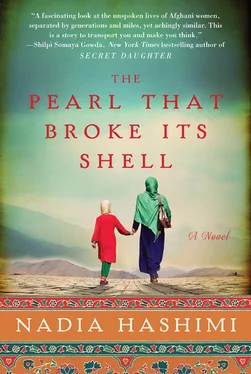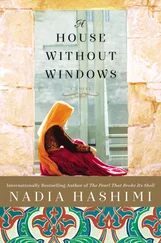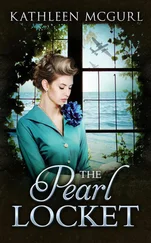I was sure she was right. They were surviving in a home without a mother or father, essentially. They’d been abandoned just as much as my own son.
“I should have taken him, Khala Shaima. I should have taken him to Kabul with me. He wouldn’t have gotten sick with me. And even if he had, I could have taken him to a hospital. They have the best hospitals there. Lots of doctors. Even foreign ones.”
“Your husband never would have allowed it. He keeps his sons at his side, my dear. You know that.”
“Then I should have stayed with him. I didn’t have to go to Kabul.”
Khala Shaima said nothing. We both knew it had been her idea.
My son was buried in the family plot, a half kilometer from the compound. It was sacred earth for Abdul Khaliq’s family.
My husband was quiet, different. I knew he was hurt.
“He’s with his ancestors now. They’re watching over him, as is Allah. His fate is our fate,” Abdul Khaliq said to me when the men returned from the burial.
Naseeb. Was it really Jahangir’s destiny to be taken so young? Was it my naseeb never to see my son grow taller than me, to go to school, to help his father at work?
Abdul Khaliq asked Jameela to look after me. I saw him pull her aside and have a few words. They watched me. Badriya too, although a week after Jahangir was buried, she quietly asked Abdul Khaliq when she could return to Kabul. His hand flew across her face so fast that she’d barely finished her sentence.
I closed my eyes and wished for everyone to disappear, including myself.
Every Friday, Abdul Khaliq’s friends and family members gathered at our compound for a khatm . Each person read one of the thirty parts of the Qur’an. Prayers were said at the completion, or khatm, of the holy book. I could hear them from down the hall and prayed along with them, hoping it did Jahangir some good. It did me none.
Khala Shaima came back more often than before, even though the trip had become very difficult for her. She was worried. I was losing weight; my clothes hung loosely on me. When I looked in the mirror I saw someone I barely recognized. My face had dark spots and my eyes were heavy. I saw Jameela and Khala Shaima exchange worried looks.
Abdul Khaliq let me be for the most part. He wasn’t speaking much either. His guards tiptoed around him. His friends kept their voices low and their comments brief. My husband, the warlord, was not one to express or show emotion, but it was clear that he was grieving. He was short even with Bibi Gulalai.
My head felt like an empty, dark room. My insides were painfully hollow. I missed my son’s face, his smile, the way his small fingers held on to mine. He was supposed to be safe. He had survived infancy. He had learned to walk, to talk, to tell me when he was hungry and when he was happy. Jahangir. His name was a dagger. His name was a salve.
Four weeks passed before I was able to ask the questions that remained.
“Jameela- jan .”
Jameela stopped short, surprised to hear my voice. “Yes?”
“What happened to him?”
Jameela stood still for a moment, pondering my question. Then she sat on the cushion next to me in the living room, tucking her legs under her and straightening her skirt. She put her hand on mine.
“Rahima- jan, he became ill. Everything happened very quickly. So quickly.” Her mind traveled back to that day. “Abdul Khaliq called Badriya right away.”
“I want to know what happened to him,” I said insistently.
After me, Jameela probably carried the most guilt. I’d left Jahangir in her care and come back to find my son dead. She felt terrible about it. She wasn’t sure how much to explain and how much to leave unsaid. She told me in bits and pieces, filtering as she went along.
First came the fever. His body was hot. From his head to his toes, so hot, Jameela said. She had tried to fan him, to cool him down with baths. His bowels were loose. Jameela looked for worms but saw nothing in his stool. When he started to complain about his stomach hurting, she’d talked to Abdul Khaliq. He saw Jahangir’s trembling body and immediately called for Bibi Gulalai. Bibi Gulalai set to work making a soup heavy with garlic and herbs to clear the germ from his body. But instead of getting better, things got worse.
On the fourth day, Jahangir’s belly was freckled with red spots. Jameela tried again to cool him with moist cloths on his forehead and sips of water. When Jahangir stopped whining and complaining about his belly, she thought he was finally getting better. She thought he needed a few days of rest and that by the time we returned he would be back to his usual self, just as I’d left him.
We were both crying. She paused her story two or three times, collecting herself and then looking at me. I nodded for her to continue. I needed to know.
By that afternoon, Jameela realized that Jahangir was delirious. He wasn’t answering her questions but he was mumbling and batting away something that wasn’t there. She called his name. His eyes were glassy. She called again for Abdul Khaliq, who had just returned from an overnight trip with his guards. Never before had she seen our husband so shaken, Jameela said. He took one look at his son, then flew out the door and summoned his driver and guards. He came back into the room and cradled Jahangir in his arms while he yelled for Jameela to pack some water and bread for the drive to the hospital. Before she knew it, Jameela was standing at the front gate, watching the tires of Abdul Khaliq’s black truck spin and screech as they tore off down the road.
She didn’t want to go on. I put my hand on hers. She looked tortured. She sighed and continued, trying to get her words out in one short burst.
They came back the next day, heavy, morose faces. Jameela ran out to meet them. Abdul Khaliq looked at her and shook his head.
“Crying,” she said. “I’ve never seen him looking like that. I never thought… the doctor wasn’t able to do anything for him. He was too weak and they think he had developed a terrible infection of his stomach. Horrible. Something that just took over, making his belly stone-hard when the doctor tried to touch it. He was in the hospital until morning and they were giving him serum but it didn’t work. I suppose… I suppose it was his naseeb, ” she said, sobbing. “Rahima- jan, I’m so sorry. I don’t know how he got so sick so quickly! He felt better for a bit. He let me rub his stomach. I thought it was helping…”
“Why didn’t he take my son to the doctor sooner?” I knew she felt badly. At the moment, I didn’t care very much. I wanted to know if something could have been done. I wanted to know who to blame.
“Abdul Khaliq? He… he wanted to. Before he left for his meetings.”
“Then why didn’t he?”
Jameela shook her head in frustration. “Rahima- jan, what’s done is done now. It won’t help anything to ask so many questions. It’s best you think of your son, pray for him to be in peace.”
“I’m tired of praying, damn it. I want to know. What happened, Jameela?” I said insistently. She was glossing over something.
“Abdul Khaliq was going to take Jahangir to the hospital but… but Bibi Gulalai stopped him.”
“ What? Why on earth would she do that?”
“She thought… she thought she could heal him with the teas and soups she was making for him.”
My heart sank. Bibi Gulalai was going to save him. I nearly laughed. Her concoctions had never saved anyone from anything. She had stood in the way of my son getting to the doctor. My husband had tried, I thought.
“He really did try,” Jameela echoed, as if she could read my thoughts.
Читать дальше












